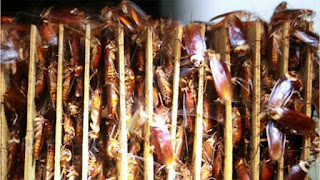Hia! Cockroach Farming

Photo credit: Science How Stuff Works
Although at its infancy stage in Africa, insect farming already has more than 850 farms. Approximately 18 edible insect species have been found viable for farming, and cockroaches are one of these insects. Although considered dirty and smelly, cockroach farming is certified as the means to reduce poverty in Africa’s economy.
Apart from its economic viability, insect farming is considered to have high nutritional benefits since it combats malnutrition, which affects one out of every five individuals on the continent. Insect-eating has a long tradition in Africa, but insect cultivation is relatively new. Africa eats nearly a quarter of the 2,100 bug species that have been identified as edible across the world.
A cockroach farming pioneer
The cockroach farming style is becoming increasingly popular across Africa’s countries. Although people have been eating different insects such as locusts and flying termites, insect farming is still relatively new.
Daniel Rwehura is a cockroach farming pioneer in Tanzania. He charges 5 euros per kg of the insect. This form of farming, he claims, is incredibly inexpensive and can be done anywhere. He primarily sells to poultry and fish producers and customers who buy for personal consumption. According to him, the industry is expanding as research organisations purchase materials for their studies.
This enterprise appears to be gaining traction in Tanzania, as another farmer, Lucius Kawogo, claims to have made a fortune from it. He also receives inquiries from people who want to buy from him outside of Tanzania.
According to both farmers, Cockroaches require no nourishment other than leftovers from local garbage disposal facilities, thus reducing farming expenses and making it simple
According to a recent World Bank report titled, “Insect and Hydroponic Farming in Africa: The New Circular Food Economy”, insect and hydroponic crop farming has the prospect of increasing food accessibility, providing employment, helping the climate and the environment, and boosting national economies for both human and animal.
Juergen Voegele, World Bank Vice President for Sustainable Development, said, “The world’s natural resources cannot sustain the current footprint of agriculture, especially when it comes to animal feed. We need a heavily disruptive and resilient food production model to reverse current trends. The report makes a persuasive case for insect and hydroponic farming to complement conventional farming.
Together with other investments in climate-smart agriculture, these technologies are part of a good menu of solutions that can help countries move their agriculture systems toward greater sustainability and reduced emissions”.
According to the organisation, insect farming might provide up to 14% of the crude protein required to feed Africa’s pigs, goats, fish, and poultry. An estimated 2 billion individuals already eat insects obtained in the wild across the world. Cockroach farming in Africa’s market is therefore projected to be about $8 billion by 2030, a growth of 24% compound annual growth rate (CAGR) over a decade.
Nutritional value of cockroaches
In terms of nutritional values, cockroach milk is more nutritious than cow milk, buffalo, and human breast milk. Also, a study from India’s Institute for Stem Cell Biology and Regenerative Medicine (inStem) suggests that cockroach milk may be the best superfood yet. It comprises 45% protein, 25% carbs, 16–22% fat (lipids), and 5% amino acids.
Cockroach milk is also an excellent source of other nutrients such as oleic acid, linoleic acid, omega-3 fatty acids, vitamins, minerals, and short- and medium-chain fatty acids, according to studies. It’s also a non-dairy milk substitute that’s a complete protein source, containing all nine necessary amino acids. Because non-meat diets usually lack one or more of these nutrients, cockroach milk provides a unique option.



Comments
Post a Comment